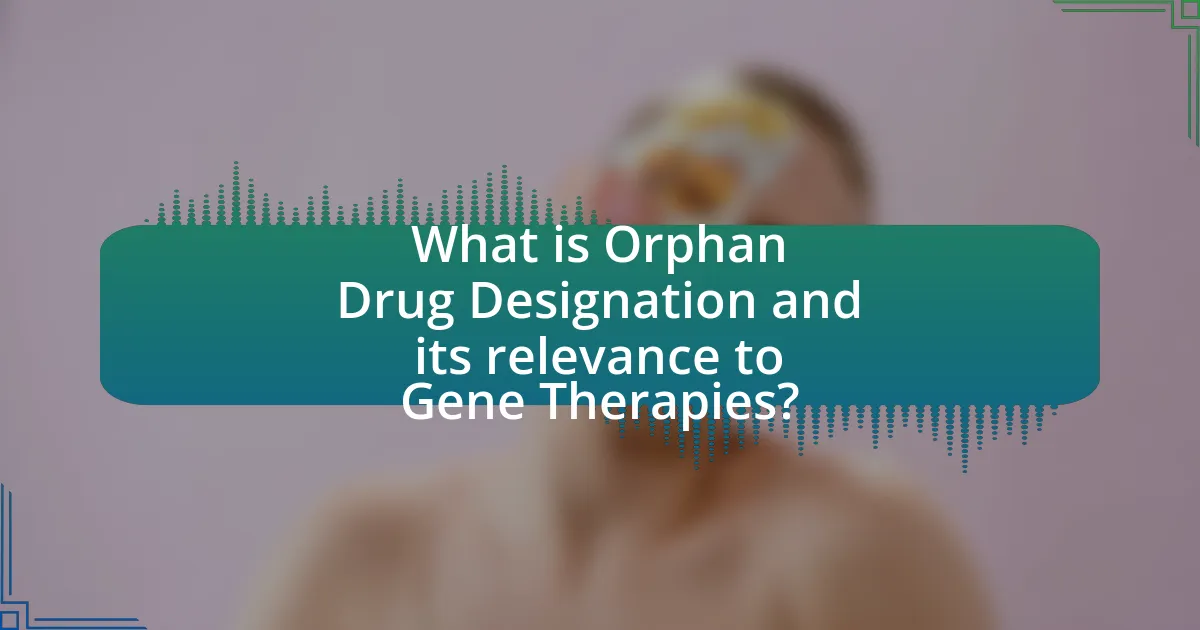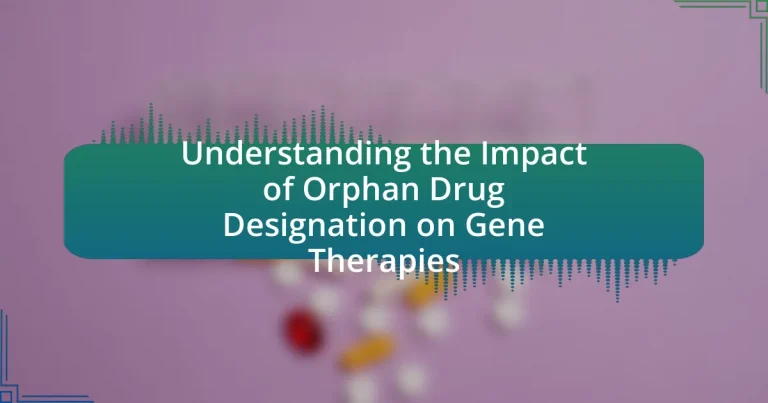Orphan Drug Designation is a regulatory status granted to encourage the development of treatments for rare diseases affecting fewer than 200,000 individuals in the United States. This designation is particularly significant for gene therapies, as it offers various incentives, including tax credits, market exclusivity, and regulatory support, which facilitate the development of innovative treatments for rare genetic disorders. The article explores the criteria for receiving this designation, its impact on research funding, the approval process, and the challenges faced by gene therapies despite these incentives. Additionally, it examines how market dynamics and potential legislative changes could influence the future landscape of gene therapies under the Orphan Drug Designation framework.

What is Orphan Drug Designation and its relevance to Gene Therapies?
Orphan Drug Designation is a status granted by regulatory authorities, such as the FDA, to encourage the development of treatments for rare diseases affecting fewer than 200,000 individuals in the United States. This designation is particularly relevant to gene therapies because it provides incentives such as tax credits for clinical trial costs, exemption from certain FDA fees, and a seven-year market exclusivity period upon approval. These benefits facilitate the development of innovative gene therapies aimed at treating rare genetic disorders, thereby addressing unmet medical needs and promoting research in this critical area of healthcare.
How does Orphan Drug Designation impact the development of Gene Therapies?
Orphan Drug Designation significantly accelerates the development of gene therapies by providing various incentives to developers. These incentives include tax credits for clinical trial costs, a seven-year period of market exclusivity upon approval, and assistance in the regulatory process from the FDA. For instance, the Orphan Drug Act of 1983 in the United States has led to over 1,000 orphan drugs being approved, demonstrating its effectiveness in promoting treatments for rare diseases. This designation encourages pharmaceutical companies to invest in gene therapies targeting rare genetic disorders, which might otherwise be deemed unprofitable due to small patient populations.
What criteria must be met for a Gene Therapy to receive Orphan Drug Designation?
A Gene Therapy must meet specific criteria to receive Orphan Drug Designation, including the requirement that the therapy is intended to treat a rare disease or condition affecting fewer than 200,000 individuals in the United States. Additionally, the therapy must demonstrate that it has the potential to provide a significant benefit over existing treatments, or that there are no adequate treatments available. The Orphan Drug Act, established in 1983, provides these guidelines to encourage the development of therapies for rare diseases by offering incentives such as tax credits and market exclusivity.
How does the designation influence research funding for Gene Therapies?
The designation of orphan drug status significantly influences research funding for gene therapies by providing financial incentives and regulatory advantages. Specifically, this designation can lead to tax credits, grants, and extended market exclusivity, which collectively enhance the attractiveness of investing in the development of gene therapies for rare diseases. For instance, the Orphan Drug Act in the United States offers a 25% tax credit on clinical trial expenses and seven years of market exclusivity, which can substantially reduce the financial risk for companies and encourage them to allocate resources toward research and development in this area.
What are the regulatory benefits of Orphan Drug Designation for Gene Therapies?
Orphan Drug Designation provides significant regulatory benefits for gene therapies, including market exclusivity, tax incentives, and reduced fees. Specifically, the designation grants seven years of market exclusivity upon approval, preventing competitors from marketing similar products during that period. Additionally, companies may receive tax credits for clinical trial costs, which can offset development expenses. Furthermore, the FDA often provides guidance and support throughout the development process, facilitating faster approval timelines. These benefits are crucial for encouraging the development of therapies for rare diseases, which may otherwise lack commercial viability due to limited patient populations.
How does Orphan Drug Designation affect the approval process for Gene Therapies?
Orphan Drug Designation significantly accelerates the approval process for gene therapies by providing various incentives to developers. This designation, granted by regulatory agencies like the FDA, allows for benefits such as a seven-year market exclusivity period, reduced fees for application submissions, and the potential for expedited review processes. For instance, the FDA’s Orphan Drug Act encourages the development of treatments for rare diseases affecting fewer than 200,000 individuals in the U.S., which often includes many gene therapies. This regulatory support can lead to faster patient access to innovative treatments, as seen with therapies like Zolgensma, which received Orphan Drug Designation and was approved in a shorter timeframe compared to non-designated drugs.
What incentives does the designation provide to pharmaceutical companies?
The orphan drug designation provides pharmaceutical companies with several key incentives, including market exclusivity, tax credits, and grants for clinical research. Specifically, companies benefit from a seven-year period of market exclusivity in the United States, which prevents competitors from marketing a similar drug for the same indication. Additionally, the designation allows for a tax credit of up to 25% of the clinical trial costs, significantly reducing the financial burden of developing treatments for rare diseases. Furthermore, companies may receive grants from the FDA to support the development of orphan drugs, enhancing their ability to bring innovative therapies to market. These incentives collectively encourage investment in the development of treatments for conditions that affect fewer patients, ultimately fostering advancements in gene therapies.
What challenges do Gene Therapies face despite Orphan Drug Designation?
Gene therapies face significant challenges despite Orphan Drug Designation, primarily related to high development costs and limited patient populations. The financial burden of developing gene therapies can exceed billions of dollars, making it difficult for companies to recoup investments, even with the incentives provided by Orphan Drug Designation. Additionally, the small number of patients eligible for treatment can hinder the feasibility of conducting large-scale clinical trials, which are essential for regulatory approval. According to a study published in the journal “Nature Biotechnology,” the average cost of developing a gene therapy can reach $1.5 billion, highlighting the economic barriers that persist despite regulatory incentives. Furthermore, the complexity of gene therapies, including manufacturing and delivery challenges, adds to the difficulties faced in bringing these treatments to market.
How do market dynamics influence the success of Gene Therapies with Orphan Drug Designation?
Market dynamics significantly influence the success of gene therapies with Orphan Drug Designation by affecting pricing, reimbursement, and market access. The limited patient population for orphan diseases often leads to higher prices, which can be supported by the economic model of rare disease treatments; for instance, the average cost of gene therapies can exceed $1 million per patient. Additionally, favorable regulatory incentives, such as extended market exclusivity and tax credits, enhance the commercial viability of these therapies. Market competition, particularly from emerging therapies, can also impact the success of existing gene therapies, as seen in the case of gene therapies for spinal muscular atrophy, where multiple products have entered the market, influencing pricing strategies and patient access.
What are the potential limitations of Orphan Drug Designation for Gene Therapies?
The potential limitations of Orphan Drug Designation for gene therapies include restricted market exclusivity, high development costs, and regulatory hurdles. While Orphan Drug Designation provides incentives such as tax credits and reduced fees, it does not guarantee financial viability due to the small patient population, which can lead to insufficient return on investment. Additionally, the complexity of gene therapies often results in lengthy and costly clinical trials, which may not align with the designation’s intended benefits. Furthermore, regulatory agencies may impose stringent requirements for safety and efficacy, complicating the approval process and potentially delaying access to treatments for patients.
How does Orphan Drug Designation shape patient access to Gene Therapies?
Orphan Drug Designation significantly enhances patient access to gene therapies by providing incentives for pharmaceutical companies to develop treatments for rare diseases. This designation offers benefits such as tax credits for clinical trial costs, a seven-year period of market exclusivity upon approval, and assistance in the regulatory process. For instance, the Orphan Drug Act of 1983 in the United States has led to the approval of over 700 orphan drugs, facilitating access to therapies for conditions affecting fewer than 200,000 patients. Consequently, these incentives encourage investment in research and development, ultimately leading to increased availability of gene therapies for patients with rare genetic disorders.
What role does Orphan Drug Designation play in pricing and reimbursement for Gene Therapies?
Orphan Drug Designation significantly influences the pricing and reimbursement of gene therapies by providing incentives that can justify higher costs. This designation, granted by regulatory authorities, allows for market exclusivity, tax credits, and reduced regulatory fees, which can lead to increased investment in the development of gene therapies. For instance, the Orphan Drug Act in the United States offers a seven-year market exclusivity period post-approval, enabling companies to set higher prices without immediate competition. Additionally, the designation can facilitate faster reimbursement processes, as payers may prioritize therapies that address rare diseases. This combination of exclusivity and financial incentives supports the sustainability of gene therapy development, ultimately impacting pricing strategies and reimbursement frameworks.
How can patients benefit from the Orphan Drug Designation in accessing Gene Therapies?
Patients can benefit from the Orphan Drug Designation in accessing gene therapies by gaining expedited approval processes and financial incentives for drug developers. This designation, granted by regulatory agencies like the FDA, encourages the development of treatments for rare diseases affecting fewer than 200,000 individuals in the U.S. As a result, patients often experience faster access to innovative therapies that may otherwise be deprioritized due to limited market potential. Additionally, the designation can provide tax credits for clinical trial costs and seven years of market exclusivity, incentivizing companies to invest in gene therapies for rare conditions. This framework has led to the approval of numerous gene therapies, enhancing treatment options for patients with rare genetic disorders.
What future trends can we expect regarding Orphan Drug Designation and Gene Therapies?
Future trends indicate an increase in the number of gene therapies receiving Orphan Drug Designation, driven by advancements in genetic research and regulatory support. The FDA has streamlined the approval process for orphan drugs, resulting in a significant rise in designations; for instance, from 2013 to 2021, the number of orphan drug designations increased from 300 to over 600 annually. Additionally, as more gene therapies are developed for rare diseases, the collaboration between biotech companies and regulatory agencies is expected to strengthen, facilitating faster access to treatments for patients. This trend is further supported by the growing investment in gene therapy research, which reached approximately $3.5 billion in 2020, indicating a robust pipeline for future orphan drug candidates.
How might changes in legislation affect Orphan Drug Designation for Gene Therapies?
Changes in legislation can significantly impact Orphan Drug Designation for gene therapies by altering eligibility criteria and incentives for drug developers. For instance, if new laws expand the definition of rare diseases or streamline the application process, more gene therapies may qualify for designation, thereby increasing investment and research in this area. Conversely, if legislation tightens requirements or reduces financial incentives, it could discourage the development of gene therapies for rare conditions, as companies may find the associated costs outweigh the potential benefits. Historical examples include the Orphan Drug Act of 1983, which provided tax credits and market exclusivity, leading to a surge in orphan drug approvals, demonstrating how legislative changes can directly influence the landscape of drug development.
What innovations in Gene Therapies could emerge from the Orphan Drug Designation framework?
Innovations in gene therapies that could emerge from the Orphan Drug Designation framework include enhanced research funding, expedited regulatory pathways, and increased collaboration between pharmaceutical companies and academic institutions. The Orphan Drug Designation incentivizes the development of treatments for rare diseases by providing benefits such as tax credits for clinical trial costs and seven years of market exclusivity upon approval. This framework encourages investment in gene therapies targeting rare genetic disorders, which historically receive less attention due to limited market potential. For instance, the approval of gene therapies like Zolgensma for spinal muscular atrophy demonstrates how the Orphan Drug Designation can lead to breakthroughs in treating conditions that were previously considered untreatable.
What best practices should stakeholders consider regarding Orphan Drug Designation and Gene Therapies?
Stakeholders should prioritize early engagement with regulatory agencies when pursuing Orphan Drug Designation for gene therapies. This proactive approach facilitates a clear understanding of the requirements and expectations, which can streamline the development process. Additionally, stakeholders should ensure comprehensive data collection on the target patient population and the disease’s prevalence, as this information is critical for demonstrating the drug’s potential benefit. Furthermore, collaboration with patient advocacy groups can enhance insights into patient needs and improve the therapeutic approach. Evidence from the FDA indicates that therapies receiving Orphan Drug Designation can benefit from incentives such as tax credits and market exclusivity, which underscores the importance of adhering to best practices in this area.




